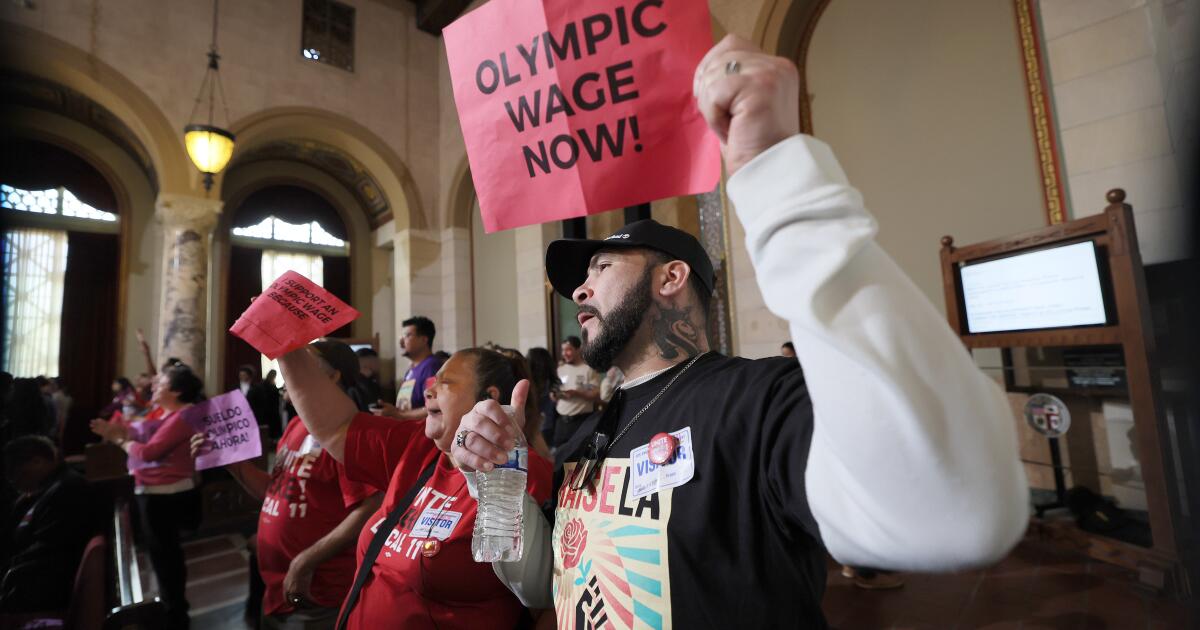A coalition of airlines, hotels and concession companies at Los Angeles International Airport filed paperwork Thursday to force a citywide vote on a new ordinance hiking the minimum wage of hotel and airport workers to $30 per hour by 2028.
The group, known as the L.A. Alliance for Tourism, Jobs and Progress, is hoping to persuade voters to repeal the ordinance. But first, the alliance would need to gather about 93,000 signatures within 30 days to qualify the measure for the ballot in an upcoming election.
Phil Singer, a spokesperson for the alliance, said the wage increase “threatens revenue Los Angeles urgently needs” — and its standing as the host of the 2028 Olympic and Paralympic Games.
“Small businesses will be forced to shut down, workers will lose their jobs, and the economic fallout will stretch across the city,” Singer said in an email. “We’re fighting for all of it: the city’s future, the jobs that sustain our communities, and the millions of guests the tourism industry proudly serves year after year.”
The new ballot measure campaign comes just two days after Mayor Karen Bass signed the minimum wage legislation into law.
The wage ordinance has been hotly opposed by an array of L.A. business organizations, which argue that it increases wages in the tourism industry too much and too quickly. However, it was welcomed by unions representing hotel and airport employees, which have supported many of the politicians who backed the measure.
The alliance’s campaign committee has received major funding from Delta Airlines, United Airlines and the American Hotel & Lodging Assn., Singer said. The group’s petition, submitted to the city clerk’s office, was signed by five businesspeople, including Greg Plummer, operator of an LAX concession company; Mark Beccaria, a partner with the Hotel Angeleno on L.A.’s Westside; and Alec Mesropian, advocacy manager with the organization known as BizFed.
The alliance is targeting a law that’s slated to push the hourly minimum wage to $22.50 on July 1 for housekeepers, parking attendants and hotel restaurant workers, as well as LAX skycaps, baggage handlers and concession employees. The wage would jump to $25 in 2026 and $27.50 in 2027.
The wage increase was spearheaded by Unite Here Local 11, the hotel and restaurant worker union, and by Service Employees International Union United Service Workers West, which represents private-sector airport workers.
Kurt Petersen, co-president of Unite Here Local 11, called the business group’s proposal “shameful” and promised his union’s members would go “toe to toe out on the streets” with the alliance’s signature gatherers.
“The hotel industry’s greed is limitless,” Petersen said. “They would rather spend millions getting them to sign this petition than pay their workers enough to live in Los Angeles. It’s shameful, but we’re confident that Angelenos will see through their deceptions and stand with workers.”
Under the city’s laws, hotel and airport workers have minimum wages that are higher than those who are employed by other industries.
The hotel minimum wage, approved by the council in 2014, is currently $20.32 per hour. The minimum wage for private-sector employees at LAX is $25.23 per hour, which includes a $5.95 hourly healthcare payment.
For nearly everyone else in L.A., the hourly minimum wage is $17.28, 78 cents higher than the state’s. The federal minimum wage is $7.25 per hour.
Backers of the airport and hotel minimum wage hikes say they will help some of the region’s lowest paid workers cover the rising cost of rent and food, while also giving them more disposable income to spend locally, delivering a boost to the region’s economy.
Detractors say it will undermine efforts by L.A.’s tourism industry to recover from the decline in business that was sparked by the outbreak of COVID-19 five years ago. They contend the ordinance will lead to layoffs, while also chilling development of new hotels.
The ordinance also requires airport and hotel businesses to provide an hourly healthcare payment — on top of the minimum wage — that starts at $7.65 in July and is expected to go up each year. (Hotels will be exempted from that requirement until 2026.)
Once the healthcare requirement is included, some businesses will be required to pay their workers an additional 60% over a three-year period, opponents of the wage increase say.
